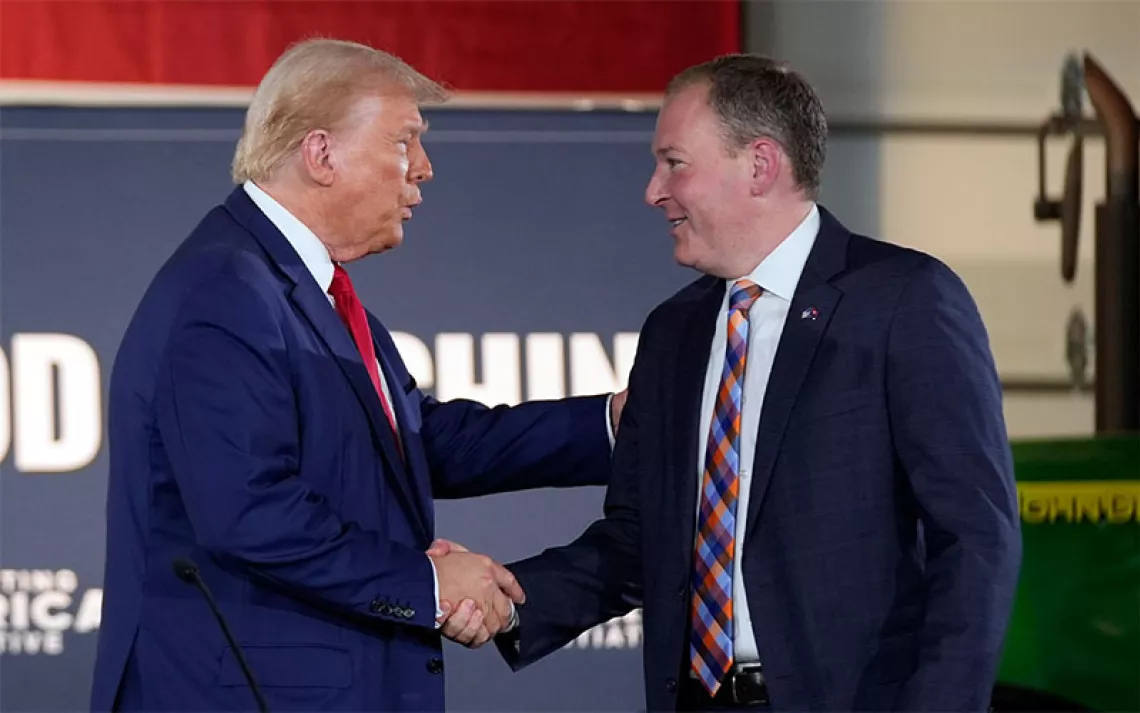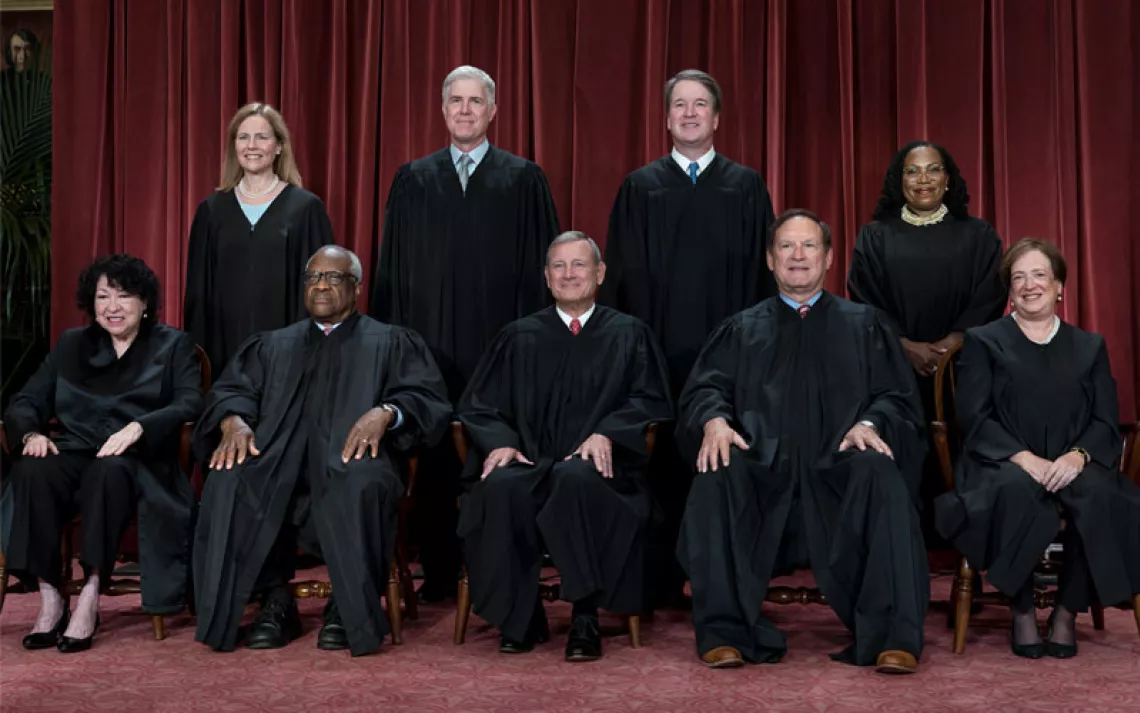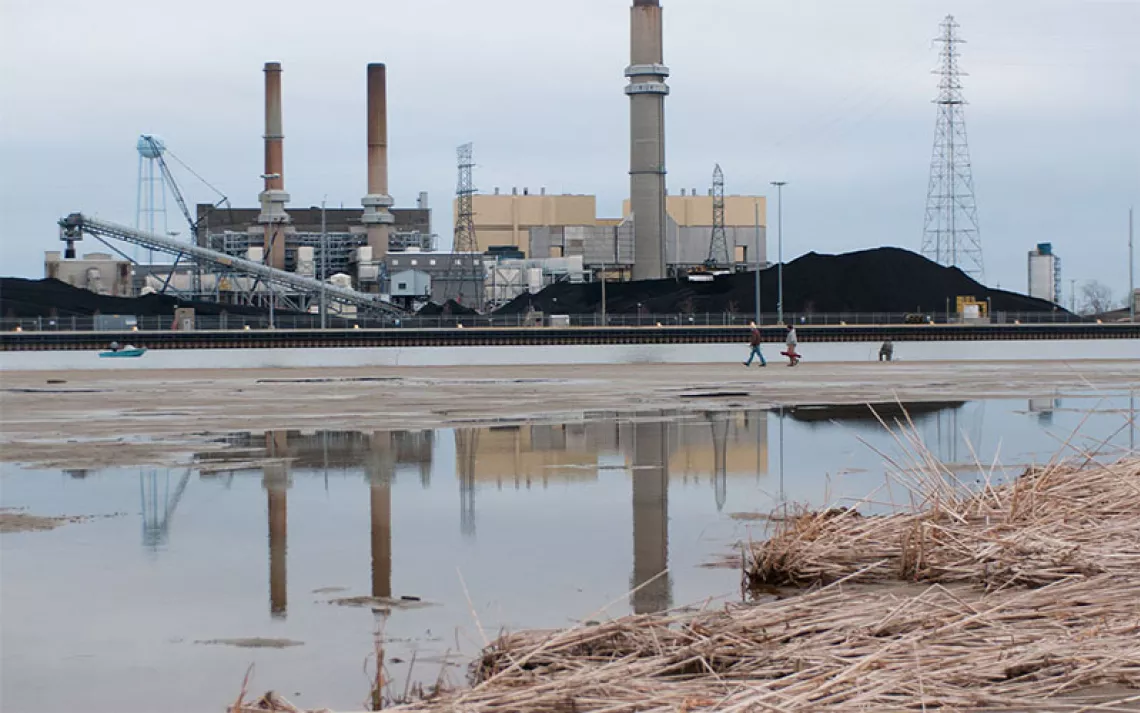Trading In a Suit and Tie for Fleece
A conversation with Avi Garbow, former EPA general counsel

Photo courtesy of Patagonia
Donald Trump is, infamously, a boastful man. The president likes to talk big but often fails to follow through. A good example is Trump’s threat to roll back environmental and public health regulations. After taking office, the president said he would be “cutting regulations massively.” But federal courts have had another idea. The administration has lost dozens of cases already—sometimes because it failed to follow basic procedures, sometimes because the merits of its arguments were flimsy at best.
To understand better why the Trump administration has fared so poorly in federal court, I called up Avi Garbow, the longest-serving general counsel at the Environmental Protection Agency. Garbow and I discussed the administration’s counterproductive distrust of federal government career staff, what it takes to do smart rule-making, and how he likes his new job working at the outdoor clothing company Patagonia.
Sierra: Correct me if I'm wrong—you were the longest-serving general counsel at the EPA.
Avi Garbow: I made that claim by about 10 days. So yes, I outlasted them all. My immediate predecessor and good friend, Scott Fulton, was just shy of two weeks short of my longevity record. It was a pleasure to have the opportunity to serve there.
Given your long history working in the government, both at the EPA and also at the Department of Justice, talk about why you think the Trump administration has had such a poor track record in federal court. According to a Washington Post analysis, the Trump administration has lost at least 63 rulings, many of them on environmental issues. Why do you think it has fared so poorly?
So the reason for early losses will likely be, I trust, different from what I hope to be later-in-time losses. Let me explain. Many of the early actions undertaken by the Trump EPA, in particular, were designed to address existing rules largely put in place under the Obama administration. And there is a robust and sometimes lengthy process under the Administrative Procedure Act to undo regulations. You can only undo a notice-and-comment regulation through a notice-and-comment regulation.
I think the Trump administration was exceedingly eager to make some changes on behalf of industry or those stakeholders that I think they found most important for them. And in so doing, they did a lot of shortcuts. Most of the early-on actions undertaken by the Trump EPA were attempts to either quickly reverse, or more often to quickly delay, the effectiveness or the compliance deadlines for rules that they intended to reconsider. And they did most of those in ways that violated not the underlying statutes themselves—that is to say, not the underlying Clean Air Act or Clean Water Act. Their missteps are largely procedural under the Administrative Procedure Act.
Now, I mentioned earlier that I think the reasons for those losses will likely be different from what I hope to be losses in the ensuing months and year and a half. That’s because the Trump administration has gotten beyond those initial efforts to truncate the process; they are now beginning to roll out final and substantive reversals of Obama-era regulations like the Clean Power Plan. There, I think their weaknesses are most likely going to be on the record—that is to say, not process, but on substance, the lack of rule of law, the lack of science, etc. I hope that will be their Achilles' heel going forward.
An example of that would be when a federal judge recently struck down an Interior Department effort to lift an Obama-era coal-mining moratorium? Judge Brian Morris, of the US District Court of Montana, says that Interior “failed to take even the initial step of determining the extent of environmental analysis.” I mean, they're not even doing their homework.
Yeah, though, I think that is even a little different than some of the other early procedural missteps. That went to this administration's blind eye to the climate impacts of oil and gas actions or fossil fuel activity. And the failure certainly under NEPA or other statutes that require that agencies actually consider all of the—not just positive but the negative—impacts of their action in the environment to include, of course, impacts on global warming and our changing climate. That was an area that I think this administration has willfully been blind to.
So it’s a case of going too fast and ending up nowhere? They’re not even fulfilling their own political objectives.
These were all mistakes that could have been avoided. And, I should point out, they were avoided eight years ago, when the Obama administration came into power. When we were there, we worked very hard to make sure that in looking back on George W. Bush–era regulations, that we followed the right process or procedures necessary to reconsider or reevaluate those particular standards. So if you compare and contrast just the first six to 18 months, where each incoming administration was looking back and reconsidering regulations or rules by the previous administration, the Trump administration's record is pathetic.
The Trump political staff hasn't made much secret of its disinterest in the opinions of career staff. I'm thinking of some of the great reporting done by Michael Lewis, looking at how the Trump administration has mismanaged key agencies. If they had just listened to the career staff more, might they have been able to achieve their objectives in the first couple years of the administration?
Well, look, there are two pieces to the question you've asked. One is, "Should you ask for advice? And listen to that advice?" There I think certainly—through reports that I have heard—this administration, in many ways unheard of in prior transitions, came in with a disdain for the advice of the career officials. Or with some unimaginable distrust of either their expertise or their capability to provide good, solid, sensible advice.
The second part of that is, "Once you solicit that advice, do you follow it?" I think there were probably breakdowns in both respects. So even in those instances where advice was given, one might suppose, from the outside, that in any of those cases that resulted in judicial defeats, the advice of the career staff—those who actually have the most expertise, particularly on process—may not have been fully appreciated, or fully heeded, in the ultimate decision-making.
Do you worry that perhaps now in this second half of the first term, the Trump administration might have learned from some of those mistakes? Now there are folks in high positions—I'm thinking of David Bernhardt, secretary of the interior, and Andrew Wheeler at EPA—who know how to move the machine. They served in previous Republican administrations, and they know how to avoid those mistakes.
Yeah, I absolutely worry. But the reason I worry is that I can see the outcomes [of Obama administration actions]. If you’re interested in protecting public health and the environment, I fear that this administration is going to at least complete its initial rollback agenda.
I don't think there'll be the same degree of ethical missteps [as plagued Scott Pruitt and Ryan Zinke], which certainly create their own sideshows here in Washington and elsewhere. And I don't think that there will be the same degree of procedural missteps. Because I do think that they're probably listening a little bit more to the career staff. And also, they're just beyond that stage in the regulatory process.
But at the end of the day, when these cases are challenged, this administration is going to have to stand behind its basis for reversing course. And that has to be based on science and the law. It doesn't matter the degree to which Bernhardt or Wheeler or others aligned with them come in with a lot of experience in promulgating regulations in past administrations. That experience doesn't count at some point. What does count is the rationale and the basis for the actions that they're taking. And if the science isn't there and if the law isn’t there, no amount of experience is going to carry them through the courts.
So you remain cautiously optimistic that the science and the law will prevail?
Well, let me put it this way. I'm extremely confident that the rules that were promulgated in the Obama administration were done right. And when I say were done right, it's that they were done on a full vetting and with an understanding of the best science, of the best technology that's out there, of all of the criteria and standards that our laws require us in government to consider. So I think they are very strong.
It doesn't mean that they're unbreakable. Or that the standards cannot be raised or lowered, depending upon changing circumstances. But the extensive record that supported them does not render them susceptible to easy reversal. So that is the reason that I have some calm. Not that this administration isn't going to fight and isn’t going to try to finalize [some rule reversals]. But ultimately, I think that the record that supported the Obama regulations is very strong and will be difficult to challenge in court.
Let's talk about one of those. You worked on the development of the Clean Power Plan. By all accounts that was thousands—tens of thousands—of staff hours going into developing a plan that would be defensible.
There's no question that the Clean Power Plan is, I think, a shining example of how agencies ought to conduct serious regulations, and how the public ought to have confidence in the ability of an agency like EPA to do so. This was a [regulation] that had, I think, in excess of 4 million public comments, which, to my knowledge, is the largest number ever. It was extraordinarily well researched and well considered. Changes—very significant changes—were made between the proposal and the final, because of comments raised by the public, industry, and others who submitted information to the agency. So, you know, there were no preconceived notions with the Clean Power Plan. [We used] the legal tools available to us under the Clean Air Act to faithfully address one of the environmental challenges that we're facing: climate change. I'm very proud of the way that the Obama administration, and the leadership at EPA under Gina McCarthy and others, conducted ourselves. I see that as a great example of public engagement and how an agency's interactions with the public resulted in a very solid rule.
My understanding is that before being at EPA, you were at the enforcement division at Department of Justice, right?
Yeah, not immediately prior to EPA, but in the mid-to-late '90s and through 2002. I was actually in the environmental-crime section. I worked in the criminal-enforcement side of things.
The enforcement of environmental cases has dropped dramatically since Trump took office. According one analysis, it might be a third as many cases as what they were doing during Obama's first term. What's the real-world effect of that? If EPA isn’t moving cases forward to the Department of Justice, what does that mean for people on the ground?
I recall a number of years ago seeing studies that looked—not at rates of enforcement—but looked at the rate of noncompliance in the regulated community under various statutes, Clean Water Act or Clean Air Act. And I remember being astonished by the very high rates of noncompliance. Now, these instances of noncompliance have a range of real-world impacts. Some of them are going to be failures to report discharges or incorrect or false information on discharge monitoring reports, and things of that nature. Others are going to be much more egregious. But the point is that the body of environmental regulation is complex, in some instances costly, but in all instances highly beneficial. It's what protects our health and protects our environment.
It’s very important for several reasons to have sound and strong enforcement. The environmental cop on the beat not only protects people in communities from the bad actors out there, but it also levels the playing field. Those companies who are making the investments and comply with the laws shouldn't suffer economic disadvantages because some of their competitors are skirting the regulation. The only way to address unevenness is through a strong and thorough enforcement program.
It almost brings us back to the 1950s or '60s, before the enactment of the landmark environmental laws like the Clean Air Act and the Clean Water Act, where if you were being a good corporate citizen, you actually had a competitive disadvantage. That’s what you’re getting at?
Yeah, I am. And this will vary, depending on the size of companies or industry by industry. But it's just one of the many reasons why it's important to have a strong enforcement program. I think there are a lot of ways to measure the effectiveness of that program. And there's no question that at the end of the day, really what we're all interested in is compliance.
I want to talk about your new gig. You're the “environmental advocate” at Patagonia. The company has taken a really prominent role around public lands in the West—trying to defend Bears Ears and Grand Staircase–Escalante National Monuments. What can a company like Patagonia do in terms of litigation to help stop attacks on the environment and public health and public lands?
I think first and foremost, part of our legacy, which continues today, is our fervent support of grassroots activists. This has been a theme for decades at Patagonia. We fund and work with and support literally hundreds of environmental grassroots activists and organizations in every state in the country. So we've already had our hand in their successes a little bit. Beyond that, I think there's a lot of things that Patagonia both can do and is doing. You mentioned the current litigation on the national monuments case in Bears Ears. There's an instance, which you don't find very often, [in which] a private company has filed a lawsuit against the United States to challenge the lawfulness of an action.
Recently, we filed public comments that were very critical of the Trump EPA’s redefinition of the Waters of the United States. And we'll continue to look for any and all avenues that we think are appropriate to both speak up and oppose the significant regulatory onslaught and rollback that we're all experiencing under the Trump administration.
Without giving away the playbook, are there other issues you imagine the company will be speaking up on?
I think climate change is an issue that requires companies like Patagonia to speak up. Many of us view this as a seminal moment in how we can protect our future. This is a generational issue, when those of us that have the ability to step up and find solutions need to do so. I think Patagonia will look very critically and closely at any of the anticipated climate rollbacks.
But beyond being critical of them—which we need to be—we're also very interested in looking for and helping to implement solutions to our climate crisis. So one of the issues that Patagonia is very involved in is promoting things like regenerative organic agriculture, which is kind of a solution that not only provides a healthier food supply and far better and more humane way of farming, but can provide tremendous climate-related benefits in terms of the carbon that’s sequestered in healthier soils. So at the same time that we're looking to make sure that we don't take a step backward with this administration, we're also looking for ways that collectively, we can take some steps forward.
Okay, I gotta ask you just one final question. In earlier official portraits, when you were at EPA, you were clean-shaven. In your new portraits that are appearing online, you've got a full beard. Was that part of blending in there at Patagonia?
The blending in was the shedding of my suit for, shall we say, slightly more comfortable clothing. No, the beard—and all the gray that came in with it—is more the product of a lack of a razor during my last summer vacation back in August. And my two sons rooted me on during its initial growth.
This conversation has been edited for clarity and length.
 The Magazine of The Sierra Club
The Magazine of The Sierra Club



